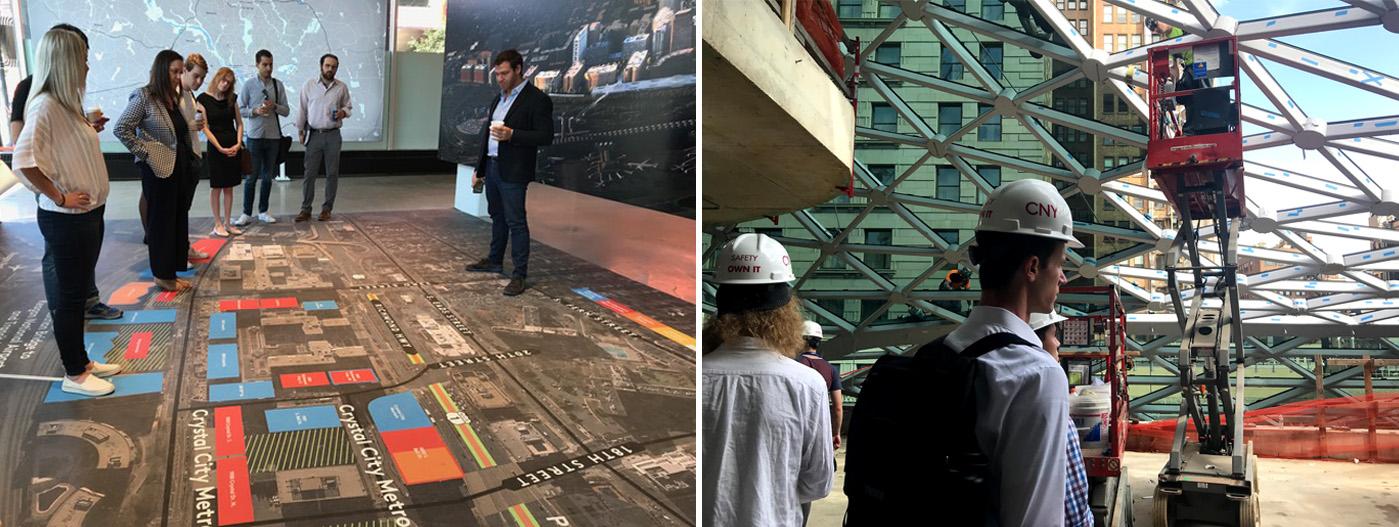Investing in the Future of the Built Environment
ABOUT THE CERTIFICATE PROGRAM
The Certificate in Real Estate Design and Development provides an opportunity for graduate students in all four disciplines (Architecture, Architectural History, Landscape Architecture and Urban + Environmental Planning) in the UVA School of Architecture, and in other affiliated UVA Schools, to expand their professional training to achieve a fundamental understanding of the dynamics and processes of private for-profit and non-profit real estate design and property development.
THE PROGRAM RECOGNIZES THAT REAL ESTATE DEVELOPMENT IS INHERENTLY INTERDISCIPLINARY—SITTING AT THE INTERSECTION OF ARCHITECTURE AND DESIGN, LAW, FINANCE, ENGINEERING, PLANNING AND GOVERNMENT.

OVERVIEW + PROGRAM GOALS
GROUNDED IN THE A-SCHOOL
Emphasize the importance of design and community engagement in real estate development; infuse business acumen into the design and planning curriculum; produce collaborative leaders able to work and communicate effectively across industries.
CONNECTED ACROSS GROUNDS
Build pan-University partnerships between the School of Architecture, the McIntire School of Commerce, the School of Engineering and Applied Sciences, the Darden School of Business, and the School of Law in order to foster true cross-disciplinary study and expertise.
DEDICATED TO OUR VALUES
Reflect our long-standing commitment to environmental sustainability, social equity, public service and design excellence.
ENGAGED NETWORK
Integrate our talented alumni and their professional networks into the program to bring real-world projects and knowledge into the classroom; create a strong pipeline for jobs upon graduation.
PAN-UNIVERSITY REAL ESTATE DEVELOPMENT INITIATIVE
In addition to the graduate certificate program at the School of Architecture, Schools across Grounds have complementary Real Estate related curricular initiatives. Collaborating most prevalently with the School of Commerce and the School of Engineering and Applied Sciences, each School provides its students the opportunity to take advantage of University-wide course offerings to expand and refine their knowledge and skills. Not only do graduate students have access to these programs, undergraduates from all Schools are able to enroll in real estate design and development courses and will eventually have the ability to pursue a minor in Real Estate at the University.
TO MAKE A GIFT TO THE REAL ESTATE DESIGN + DEVELOPMENT FUND
4 CORE + 1 ELECTIVE
REAL ESTATE DEVELOPMENT PROCESS
Focuses on the fundamentals of the real estate development process, from basic real estate relationships (developers, lenders, the public), through location/land acquisition decisions, property rights, risk management, ethics, preliminary due diligence, and more.
REAL ESTATE FINANCE FUNDAMENTALS
Investigates the role of finance in development with an emphasis on value creation; familiarizes students with the diverse ways of financing real estate projects; requires students to apply financial knowledge to self-selected real estate projects, including development of required financial documents and proforma.
DESIGN DIMENSIONS OF REAL ESTATE
Explores the reciprocal relationship of design and real estate principles and how they add value to each other in creative design and engaged planning for successful real estate projects.
APPLIED REAL ESTATE
Synthesizes students’ skills and knowledge through application of the real estate development process in a specific geographic and socio-economic setting.
REAL ESTATE + AFFORDABLE HOUSING
ELECTIVES
LINKING TO LEADERS IN THE PROFESSION
Creating a bridge between the program and the profession, the Real Estate Development Advisory Council (REDAC) provides strategic advice and feedback in the planning, application, and fulfillment of the Real Estate Design and Development certificate program. The Council members serve as leaders, and act as representatives of the School, in the University-wide effort around Real Estate Design and Development. The Council partners with the A-School Foundation in advancing the program’s long-term financial stability. REDAC members are an engaged network of professionals who bring real-world projects and knowledge to the students and the classroom, and create a strong pipeline for jobs upon graduation.
The A-School has been a leader – moving the needle forward and strongly supporting the Pan-University initiative to make UVA one of the top universities in the country for multi-disciplinary education in Real Estate Design and Development.
Interest in the graduate certificate program continues to grow, yet we are looking to further expand the opportunities offered to our students and faculty. Consider investing in the future of the program and its following priorities:
EXPERT IN RESIDENCE
In addition to our exemplary faculty, we seek to bring in a Real Estate professional as an expert in residence. S/he would mentor students through personal and professional experiences, possibly co-teach a course, be a connector to the industry, and provide a strong direct link between the program and the profession.
— $1M (named endowment for position)
STUDENT SCHOLARSHIPS AND FELLOWSHIPS
The School of Architecture aims to provide undergraduate scholarships and graduate fellowships for students interested in studying Real Estate Design and Development. Endowed funds such as these are critical assets when recruiting top students to the School.
— $100,000 (named fellowship)
APPLIED REAL ESTATE PRACTICE STUDIO SPONSOR
Sponsorship would cover student travel and accommodations, allowing students the opportunity to dive fully into a project, from concept and investigation, to permitting, to financing and construction, and gain valuable insight to applied real estate design and development.
— $30,000 (sponsors a studio) - $500,000 (named endowment of studio)
NEW YORK STUDIO SPONSOR
Each year, the School of Architecture engages approximately 80-100 students in researching and addressing an applied, practical project or opportunity in New York City. Sponsorship would cover student travel, accommodations, research costs, and material costs, allowing for hands-on analysis and learning, on-site.
— $50,000 (sponsors a studio) - $1M (named endowment of studio)
